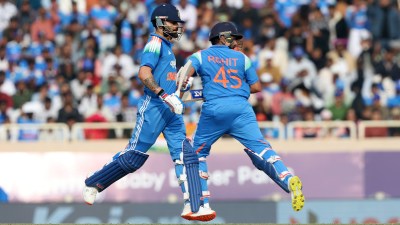Observing that India is a democratic society by nature, Prime Minister Narendra Modi said Sunday that democracy is in our veins, in our culture, and for centuries it has been an integral part of our daily lives.
In his monthly radio programme — Mann Ki Baat, PM Modi said, “India is the world’s largest democracy and we Indians are also proud of the fact that our country is also the mother of democracy.”

“Democracy is in our veins, in our culture. For centuries, it has been an integral part of our daily lives. By nature, we are a democratic society,” Modi said, addressing the 97th episode of Mann Ki Baat broadcast on All India Radio.
During his address, PM Modi said he received a book ‘India-The Mother of Democracy’ a few weeks ago. “Upon reading this book, you will realise how the spirit of democracy prevailed in every part of our country, since ages,” Modi said.
The Prime Minister said, “As mother of democracy, we must continuously think about this subject, discuss it and endeavour to make the world aware of it. This will strengthen the spirit of democracy in the country.”
PM Modi further said that Dr B R Ambedkar had compared the Buddhist Bhikshu Sangha to the Indian Parliament. “He described it as an institution which had several rules guiding the motions, resolution, quorum, voting and counting of votes. Baba Saheb was of the opinion that lord Buddha must have got the inspiration for this from the prevailing political system at that time,” Modi said.
The Prime Minister also cited an example of a Tamil Nadu village. “There is a small but famous village in Tamil Nadu, called Uthiramerur. An inscription on a rock here, some 1,100 or 1,200 years old, amazes the world. This rock inscription is like a mini-Constitution. It explains in detail how the gram sabha should be conducted and what should be the process of selection of its members,” he said.
Story continues below this ad
He added, “There is another example of democratic values in our history, the 12th-century Anubhav Mandapam of Bhagwan Basaveshwara. Here, free debate and discussion was encouraged… You may be surprised to know that this happened even before the Magna Carta,” Modi said.
The Prime Minister underlined that democratic traditions laid by the emperors of the Kakatiya Dynasty of Warangal were also well known. The Bhakti movement carried forward the culture of democracy in western India, he added.
Discussing this year’s Padma Awards announced on January 25, PM Modi said, “This year the echoes of the Padma Awards are being heard even in those areas which used to be Naxal affected. Due to their efforts, those who show the right path to the misguided youth in Naxalite-affected areas have been honoured with Padma awards.” He mentioned two Padma awardees — Ajay Kumar Mandavi, who does wood carving in Kanker in Chhattisgarh and Parshuram Komaji Khune, associated with the famous Jharipatti Rangbhoomi of Gadchiroli in Maharashtra.
He also mentioned an event called ‘Purple Fest’ held in Goa from January 6 to 8. “This was a unique effort in itself for the welfare of divyangs. How big an occasion Purple Fest was, you can all guess from the fact that more than 50,000 brothers and sisters of ours participated in it,” PM Modi highlighted.
Story continues below this ad
The Prime Minister said that for the first time in the last 11 years, the number of domestic patent filings was higher than foreign filings. “Today India’s ranking is seventh in patent filing and fifth in trademarks. Talking about patents only, there has been an increase of about 50 per cent in the last five years. In the Global Innovation Index too, India’s ranking has improved tremendously and now it has reached 40th position, while in 2015, India was behind even the 80th position in the Global Innovation Index… For the first time in the last 11 years in India, the number of domestic patent filings was seen more than foreign filings. It also shows the growing scientific prowess of India,” Modi said.
“I believe that the dream of India’s Techade will definitely be fulfilled on the strength of our innovators and their patents. With this, we all will be able to take full advantage of world class technology and products prepared in our own country,” he added.
The Prime Minister also talked about growing enthusiasm among Kashmiri youths regarding sports. “In the coming times, many of these youth will win medals for the country, and will hoist the Tricolour,” he said.
Observing that a republic becomes strong “by public participation”, Modi said, “Our efforts to strengthen our Republic should go on relentlessly. The Republic becomes strong ‘by public participation’, ‘by everyone’s effort’, ‘by performing one’s duties towards the country’, and I am satisfied that, our ‘Mann Ki Baat’, is the emphatic voice of such dutiful fighters.”

































